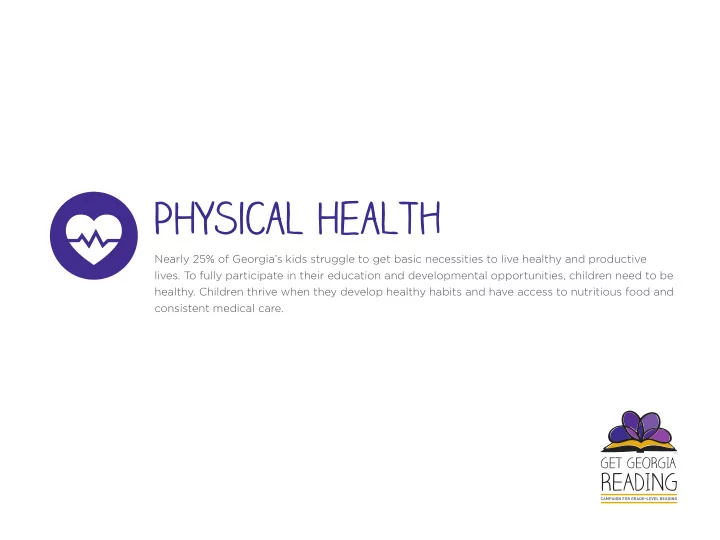

PHYsical Health Nearly 25% of Georgia’s kids struggle to get basic necessities to live healthy and productive lives. To fully participate in their education and developmental opportunities, children need to be healthy. Children thrive when they develop healthy habits and have access to nutritious food and consistent medical care.
Children’s physical activity improves grades, standardized test scores, and overall academic achievement. Centers for Disease Control and Prevention [2010]
1 in 5 children under age 6 lack a steady food source, which has a negative impact on their academic outcomes and physical, emotional, and behavioral development. United States Department of Agriculture [2015]; Journal of Developmental and Behavioral Pediatrics [2017]
Less than half of the preschool- age children who fail a vision screening are referred for diagnostic exams. National Center for Children’s Vision and Eye Health [2016]
Nearly 15% of children ages 6 to 19 struggle with hearing loss . That puts them at risk of failing at least one grade level. Journal of Otology [2006]
Participating in the Women, Infants, and Children (WIC) Program reduces child food insecurity by more than 20%. Southern Economic Journal [2016]
12% of school-aged children in Georgia have asthma and are more likely to miss school. Georgia Department of Public Health [2015]
Children in foster care are more than 2X as likely to suffer from asthma than their counterparts. Pediatrics [2016]
Common vision impairments, which affect up to 25% of children and adolescents, can lead to physical, developmental, behavioral, and academic problems if they go uncorrected. National Academies of Sciences, Engineering, and Medicine [2016]; The National Commission on Vision and Health [2009]; Centers for Disease Control and Prevention [2006]
Of Georgia’s 159 counties: 118 are considered dental health professional shortage areas, 35 don’t have a dentist that accepts Medicaid patients, and 16 don’t have a dentist. Georgia General Assembly [2017]; Georgia Health Policy Center [2012]
44% of children ages 2 to 5 and 52% of third- graders in Georgia have untreated tooth decay . Those children are more likely to have problems eating, speaking, and learning, and are almost 3X more likely to miss school than their peers with good oral health. Georgia Department of Public Health [2014]; Centers for Disease Control and Prevention [2016]; Journal of Public Health [2011]
Recommend
More recommend